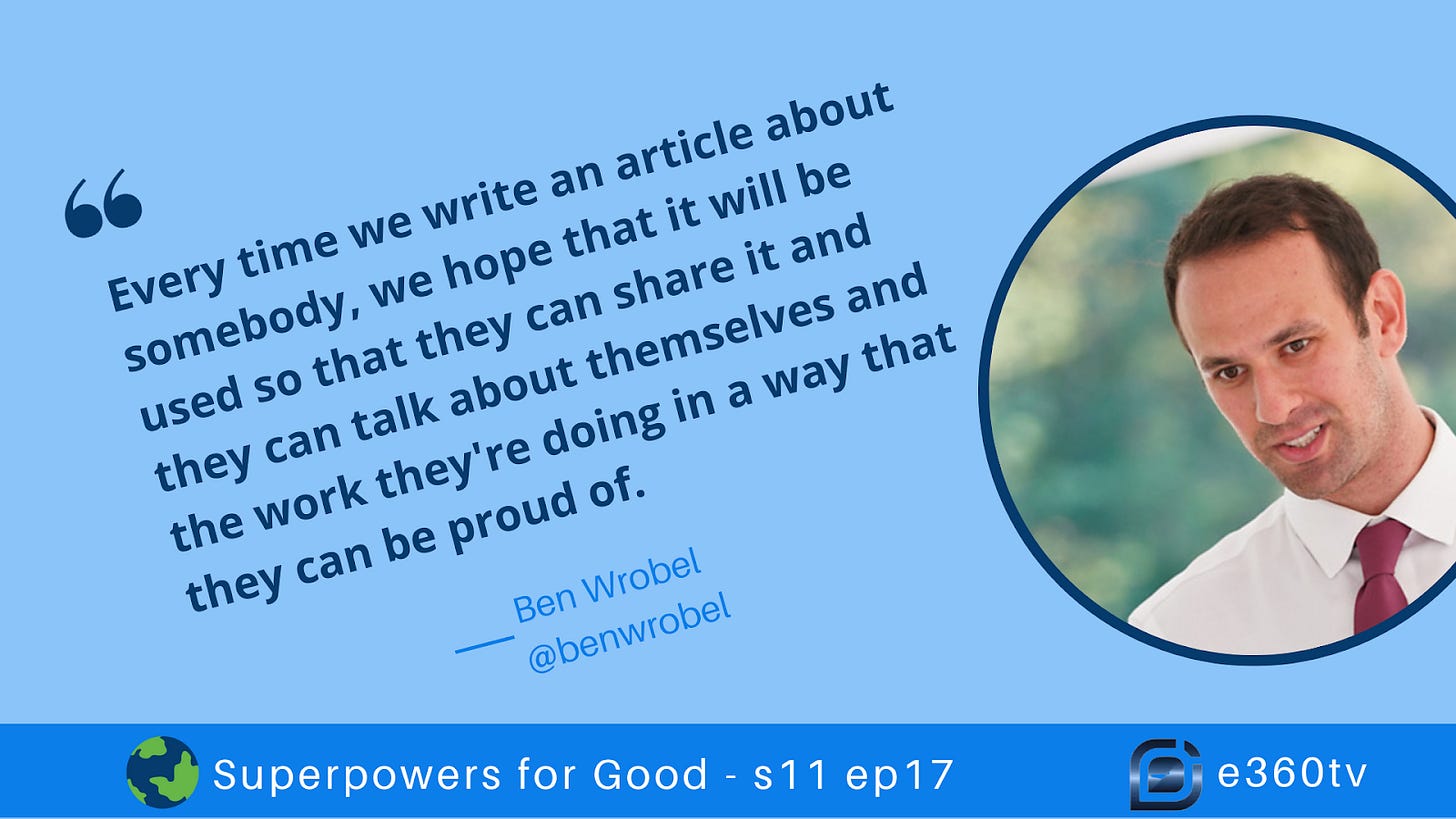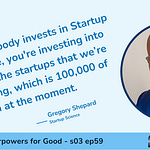Remember, you can watch the Superpowers for Good show on e360tv. To watch the episode, download the #e360tv channel app to your streaming device–Roku, AppleTV or AmazonFireTV–or your mobile device. You can even watch it on the web.
When you purchase an item after clicking a link here, we may earn a commission. It’s an easy way to support our work.
Devin: What do you see as your superpower, Kevin?
Kevin: I see my superpower as diversity of experience. I was born in a very small and very poor suburb of Detroit called Highland Park, and now I work–outside of Proximate– as an investment analyst for Gutter Capital. So, I have been in situations where I've had $0, and I can speak that language. Now, I'm the middleman for people to get investments of $1 million.
Devin: Ben, what is your superpower?
Ben: I think it has something to do with helping people tell their stories.
My guests today, Ben Wrobel and Kevin McClendon, are co-founders–along with Meg Massey–of the nonprofit media company Proximate.
“Proximate is a media platform that amplifies and connects movements for participatory problem-solving,” says Kevin. “We're a home for stories about creative community-driven models that shift power to people with lived experience or those proximate to the problem.”
The company grew naturally out of a book that Ben wrote with co-founder Meg called Letting Go. The book built on their experiences. Ben says, “I worked for a participatory investing nonprofit called Village Capital that shifted decision-making power away from investors and towards entrepreneurs closer to the problem.”
The team employs a solutions journalism lens, focusing on solutions when discussing societal challenges. Proximate narrows its aperture to primarily consider innovations in participatory philanthropy, investing and budgeting. The goal is to amplify the voices of those closest to and most impacted by problems.
I’m excited about their work, in part because it recognizes the fundamental value of the crowd in crowdfunding and the value of investors who deploy relatively small amounts of money but bring perspective from the front lines of problems.
Kevin highlights the uniqueness of the Proximate approach to news, “We're the only platform where you can find how a sex worker film festival and a food bank are solving for the same variables.”
Ben and Kevin each bring superpowers to the game. Ben leverages an ability to help others tell their stories, and Kevin shares his unique diversity of experience to the work.
AI Episode Summary
Kevin McClendon and Ben Wrobel are co-founders of Proximate, a media platform that amplifies and connects movements for participatory problem-solving.
They focus on stories about creative community-driven models that shift power to people with lived experience or those proximate to the problem.
Their work extends beyond capital and includes areas such as climate change, medical care, citizen science, and equity in the creative economy.
Proximate produces journalism and solutions journalism specifically, conveying information in a compelling way.
They hire local journalists to write about solutions in communities, such as locally-led disaster response in Puerto Rico, and cover different sectors like philanthropy, government, and impact investing.
Their goal is to be a clearinghouse for participatory problem-solving stories and create collections of stories for specific topics with the help of partner nonprofits.
Kevin's superpower is diversity of experience, having been in situations of poverty and also working as an investment analyst for Gutter Capital.
Ben's superpower is helping people tell their stories, finding people with big ideas and helping them communicate their work in a universal language.
Kevin suggests breaking silos and identifying similarities as a way to increase diversity of perspective, while Ben recommends speaking out loud and recording to overcome writer's block and improve storytelling.
To learn more about Proximate, visit their website, subscribe to their newsletters, and connect with them on social media. For Kevin, connect on LinkedIn and Instagram, and for Ben, email him or connect on LinkedIn. They are also looking for content, platform, and funding partners for collaboration.
How to Develop a Diversity of Experience As a Superpower
Kevin shared an example that illustrates his superpower:
So in writing for the participants, The Rise of Participatory ESOs, our most recent project that we've announced, because I've worked with a lot of the different industries that we covered, I had the insider look, so to speak, that I'm not writing as someone who's lived on the outside.
I'm writing as someone who has both worked inside of these organizations and as well been a person who has been in a position to receive the results of what these organizations are attempting to accomplish.
Kevin also offered some tips for expanding your own perspective. He suggests:
Break the silos and identify the similarities.
Stop creating these false barriers between groups.
Learn from what another person is doing.
By following Kevin’s example and advice, you can broaden your perspectives. In time, you may be able to make this a superpower that enables you to do more good in the world.
How to Develop Storytelling As a Superpower
Ben shared an anecdote to illustrate the power of storytelling:
One of the participatory grantmaking funds that we profiled in Letting Go had been doing this work for ten years and just had a website and were well known in their small community but were not on the radar of a lot of other folks in philanthropy or beyond.
We wrote a whole chapter about them in the book. Shortly after that, their founder and CEO left. She said, “I feel like my legacy is more secure now. Our story has been told.”
I know that since then, they've been able to raise a good amount of money. I don't think that is entirely because of Letting Go.
That's what I'm hoping to accomplish with Proximate. Every time we write an article about somebody, we hope that it will be used so that they can share it and talk about themselves and the work they're doing in a way they can be proud of.
Ben offers a powerful storytelling tip:
What I've often seen when people try to write an op-ed or write an essay, write about their work, they often are intimidated by a blank screen. Say the words out loud. Describe what you're doing to someone in your life and your family, and then take that–there is some great AI recording software out there, like Otter.ai. Turn on Otter and start talking.
This is something people used to do way back in the day. Take a recorder; speak into it. That is one of the best ways to write: speak into your computer and then figure out what you just said.
By following Ben’s example and suggestion, you can improve your storytelling. With practice, you could make it a superpower that enables you to do more good in the world.
Guest Profiles
About Proximate: Proximate is a media platform that aims to amplify and connect movements for new models of participatory problem-solving. We're a home for stories about creative, community-driven models that shift power to people with lived experience or those proximate to the problem.
Website: proximate.press/
Linkedin: linkedin.com/company/proximate-press
Company Facebook Page: facebook.com/profile.php?id=100091509354018
Kevin McClendon (he/him):
Co-Founder, Proximate
Biographical Information: Kevin is a writer and strategic professional in the early-stage investment and philanthropy ecosystems. He is driven to create a more equitable world for his son through avid support of sustainable capitalism.
Kevin serves as a Co-Founder of Proximate, helping forward a mission of shifting power to those with lived experience. He is also an investment analyst for Gutter Capital, investing in software companies tackling the world's biggest problems. Kevin began his career in marketing for a diversity of industries, including entertainment, real estate, and health care. Kevin was a member of Transforming Power Fund's 2023 Giving Project cohort.
Kevin has a BA from Wayne State University. He lives in Detroit, Michigan.
Personal Facebook Profile: facebook.com/kvnmcclendon/
Linkedin: linkedin.com/in/kevin-mcclendon/
Instagram Handle: @kvnmcclendon
Ben Wrobel (he/him):
Co-Founder, Proximate
Biographical Information: Ben Wrobel is a writer and an independent communications consultant. Before co-founding Proximate, he was Director of Communications at Village Capital, a pioneer in participatory investing. He started his career as chief speechwriter for the NAACP and later raised money for voter registration campaigns, including Stacey Abrams’ New Georgia Project.
In addition to co-authoring Letting Go: How Philanthropists and Impact Investors Can Do More Good By Giving Up Control with fellow Proximate co-founder Meg Massey, Ben has edited two best-selling books: REACH: 40 Black Men on Living, Leading and Succeeding and The Innovation Blind Spot.
Ben has a BA from the University of Rochester and an MBA from Georgetown University. He lives in New Haven, Connecticut.
Twitter Handle: @benwrobel
Instagram Handle: @benwrobel

















